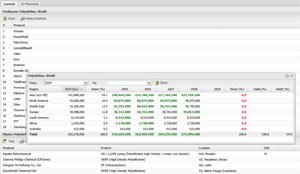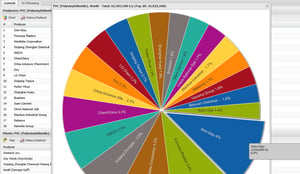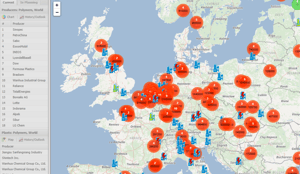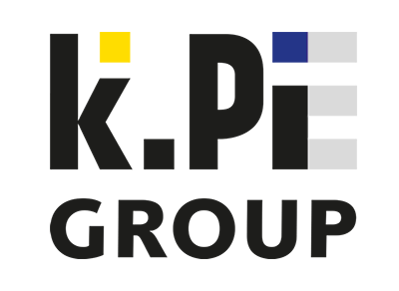
Polyglobe
Global production capacities at a glance.
Up to date - comprehensive - global!
Polyglobe
The dynamic nature of feedstock markets makes up-to-date and reliable information on the supply side essential for plastics procurement. But do you have the resources to obtain such comprehensive information?
Polyglobe contains information on worldwide producers, manufacturing locations, and capacities for almost all common polymers and feedstocks.
- Daily updated online database
- Products: Feedstocks and polymers
- Capacities: current and projected,
market shares, rankings - Current/announced/historical availabilities: Forces majeures, maintenance, etc.
- Planning: projected plants, forecasts, growth rates, etc.
- Manufacturers: product portfolio, activities, group alliances, joint ventures, etc.
6600+
Plants
2300+
Producers
1100+
Locations
79
Countries
How can you benefit from Polyglobe?
The online Polyglobe database contains global information updated daily can help you optimise procurement:
All plants / locations
- with current capacities
- with projected capacities
- with status information
All manufacturers
- with JVs and group affiliates
- with portfolio overview
Regional availabilities
- with forces majeures
- with planned maintenance
- with throttling
Market overviews
- by region and provider
Five-year forecasts
- By region and provider
Get your FREE overview of global polymer capacities
Plastics producers, locations and capacities worldwide
What is Polyglobe?
The increasing complexity of the markets is leading to growing challenges in the procurement of plastics. Up-to-date and reliable information on the supply side is essential. However, data gathered from expensive market studies is quickly outdated and offers little flexibility in terms of evaluation. In addition, procuring individual information is extremely time-consuming and rarely complete.
Market transparency the intelligent way
Polyglobe provides quick and reliable information about the present and medium-to-long-term capacity situation for global polymer production. The unique online database contains information on manufacturers, plants and capacities for plastics and their feedstocks.
It is updated daily and maintained by the PIE editorial and price teams and their network of reporters. Polyglobe offers optimum market transparency, eg on capacity utilisation and availability, as well as comprehensive statistics and forecasts. All information can be quickly and easily selected and displayed with various levels of detail. Additional background information is also available for many of the statistics to help you with your decision-making.
Best in class information at your fingertips
Best in class information at your fingertips
Buying expensive studies and the time-consuming selection and preparation of data by your employees are now a thing of the past: With Polyglobe, you get all the information you need at the touch of a button – and at a sensationally low price.
A look at the application



The intelligent way of market transparency
Polyglobe enables you to:
plan your plastics procurement more efficiently and effectively
benefit from the well-founded data on suppliers, competitors and market data
retrieve all relevant information from a single database
dispense with expensive studies and time-consuming data collection
Set up PDS via e-mail Pull
This is how easy it is to set up the Price Delivery Service via e-mail pull:
1
Register e-mail
Enter the desired e-mail address to which your price updates should be sent.
2
Setup
You will then receive an e-mail from our team with a special link.
3
Finished
Click on the link or copy it into your browser and confirm. Shortly afterwards, you will receive your customized price updates in .xls, .json and/or .csv format directly in your e-mail inbox.
Make an appointment with our experts today
Sabine Ament would be happy to help out
Intro Title
SECTION FORM - TITLE
Frequently asked questions
Here you will find answers to the most frequently asked questions about Polyglobe
Which products are displayed in Polyglobe?
Monomers
Feedstock
Benzene
Butadiene (C4)
Ethylene (C2)
Paraxylene (PX)
Propylene (C3)
Toluene
Intermediates
11-aminoundecanoic acid
Acrylonitrile (ACN)
adipic acid
Adiponitrile (ADN)
Succinic Acid
Bisphenol A (BPA)
Caprolactam
hexamethylenediamine (HMD, HMDA)
Laurolactam
Methyl Methacrylate (MMA)
Monoethylene glycol (MEG)
Phenol (Hydroxybenzene)
Styrene (SM)
Purified Terephthalic Acid (PTA)
Vinyl acetate monomer (VAM)
Polymers
Standard Plastics
Polyolefins
PE (Polyethylene)
PE Low Pressure Process (HD/LLD/Swing)
HDPE (High Density Polyethylene)
HD / LLDPE swing (Polyethylene High Density / Linear Low Density)
LLDPE (Linear Low Density Polyethylene)
PE High Pressure Process (LD/EVA/Swing)
LDPE (Low Density Polyethylene)
LDPE / EVA Swing
PE (Polyethylene) unspecified
PP (Polypropylene)
Styrenics
EPS (Expandable Polystyrene)
PS (Polystyrene)
PET (Polyethylene Terephthalate)
PVC (Polyvinylchloride)
Engineering Plastics
Polyamides
Nylon 6 and 6.6
PA 6 (Polyamide 6)
PA 6.6 (Polyamide 6,6)
Long carbon chains / Special Polyamides
PA 10 (Polyamide 10)
PA 11 (Polyamide 11)
PA 12 (Polyamide 12)
PA 4.6 (Polyamide 4.6)
PA 9T (Polyamide 9T)
Styrene copolymers
ABS (Acrylonitrile Butadiene Styrene)
SAN (Styrene Acrylonitrile)
PBT (Polybutylene Terephthalate)
PC (Polycarbonate)
PMMA (Polymethyl Methacrylate)
POM (Polyacetal, Polyformaldehyde)
High Performance Plastics
Polyketons
PEEK (Polyetheretherketone)
PEKK (Polyetherketoneketone)
PESEKK (Polyarylethersulfoneetherketoneketone)
PK (Aliphatic Polyketone)
COP/COC (Cyclo Olefin Polymers & Copolymers)
LCP (Liquid Crystal Polymers)
PEI (Polyetherimide)
PPA (Polyphthalamide)
PPO / PPE (Polyphenylene Oxide / Ether)
PPS (Polyphenylene Sulphide)
PSU/PES/PPSU (Polyarylsulphones)
PTFE (Polytetrafluoroethylene)
PVDF (Polyvinylidene Fluoride)
sPS (Syndioctactic Polystyrene)
Polyurethanes
MDI (Methylene Diphenyl Diisocyanate)
TDI (Toluene Diisocyanate)
Biopolymers (biobased and -degradable)
Biodegradable Polyester (PBAT)
PBS (Polybutylene Succinate)
PEF (polyethylenefurane)
PHA (Polyhydroxyalkanoate)
PLA (Polylactic Acid)
TPS (Thermoplastic Starch)
Feedstock
Benzene
Butadiene (C4)
Ethylene (C2)
Paraxylene (PX)
Propylene (C3)
Toluene
Intermediates
11-aminoundecanoic acid
Acrylonitrile (ACN)
adipic acid
Adiponitrile (ADN)
Succinic Acid
Bisphenol A (BPA)
Caprolactam
hexamethylenediamine (HMD, HMDA)
Laurolactam
Methyl Methacrylate (MMA)
Monoethylene glycol (MEG)
Phenol (Hydroxybenzene)
Styrene (SM)
Purified Terephthalic Acid (PTA)
Vinyl acetate monomer (VAM)
Polymers
Standard Plastics
Polyolefins
PE (Polyethylene)
PE Low Pressure Process (HD/LLD/Swing)
HDPE (High Density Polyethylene)
HD / LLDPE swing (Polyethylene High Density / Linear Low Density)
LLDPE (Linear Low Density Polyethylene)
PE High Pressure Process (LD/EVA/Swing)
LDPE (Low Density Polyethylene)
LDPE / EVA Swing
PE (Polyethylene) unspecified
PP (Polypropylene)
Styrenics
EPS (Expandable Polystyrene)
PS (Polystyrene)
PET (Polyethylene Terephthalate)
PVC (Polyvinylchloride)
Engineering Plastics
Polyamides
Nylon 6 and 6.6
PA 6 (Polyamide 6)
PA 6.6 (Polyamide 6,6)
Long carbon chains / Special Polyamides
PA 10 (Polyamide 10)
PA 11 (Polyamide 11)
PA 12 (Polyamide 12)
PA 4.6 (Polyamide 4.6)
PA 9T (Polyamide 9T)
Styrene copolymers
ABS (Acrylonitrile Butadiene Styrene)
SAN (Styrene Acrylonitrile)
PBT (Polybutylene Terephthalate)
PC (Polycarbonate)
PMMA (Polymethyl Methacrylate)
POM (Polyacetal, Polyformaldehyde)
High Performance Plastics
Polyketons
PEEK (Polyetheretherketone)
PEKK (Polyetherketoneketone)
PESEKK (Polyarylethersulfoneetherketoneketone)
PK (Aliphatic Polyketone)
COP/COC (Cyclo Olefin Polymers & Copolymers)
LCP (Liquid Crystal Polymers)
PEI (Polyetherimide)
PPA (Polyphthalamide)
PPO / PPE (Polyphenylene Oxide / Ether)
PPS (Polyphenylene Sulphide)
PSU/PES/PPSU (Polyarylsulphones)
PTFE (Polytetrafluoroethylene)
PVDF (Polyvinylidene Fluoride)
sPS (Syndioctactic Polystyrene)
Polyurethanes
MDI (Methylene Diphenyl Diisocyanate)
TDI (Toluene Diisocyanate)
Biopolymers (biobased and -degradable)
Biodegradable Polyester (PBAT)
PBS (Polybutylene Succinate)
PEF (polyethylenefurane)
PHA (Polyhydroxyalkanoate)
PLA (Polylactic Acid)
TPS (Thermoplastic Starch)
DO I NEED A PIE SUBSCRIPTION TO USE Polyglobe?
No, you can also use Polyglobe without a Plastics Information Europe (PIE) subscription. However, we recommend that you also subscribe. This way, all polymer price reports from the PIE application are automatically synchronised with the Polyglobe application.
